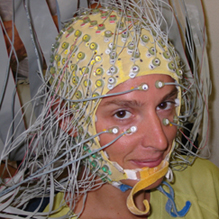Got the blues? Insert a brain pleasure chip
Only a decade away In addition to enhanced cognition, enhanced pleasure is also on the horizon, according to an article in Nature Reviews Neuroscience. A research survey conducted by Morten Kringelbach, a Danish neuroscientist at Oxford University, found that the brain’s orbitofrontal cortex could be a "new stimulation target" to help people suffering from anhedonia, an inability to experience pleasure. Stimulating this area could be as pleasurable as eating a delicious pastry, he said.
In addition to enhanced cognition, enhanced pleasure is also on the horizon, according to an article in Nature Reviews Neuroscience. A research survey conducted by Morten Kringelbach, a Danish neuroscientist at Oxford University, found that the brain’s orbitofrontal cortex could be a "new stimulation target" to help people suffering from anhedonia, an inability to experience pleasure. Stimulating this area could be as pleasurable as eating a delicious pastry, he said.
However, sniggering sub-editors all over the world preferred to highlight a more lurid spin on the study put forward by a research colleague, Tipu Aziz: an implantable "sex chip".
"There is evidence that this chip will work," Aziz told the London Times, although currently there are technical problems because the wiring is "intrusive and crude". But within ten years, it could be remote-controlled. "When the technology is improved, we can use deep brain stimulation in many new areas. It will be more subtle, with more control over the power so you may be able to turn the chip on and off when needed.
Sniggering aside, remote control of a pleasure centre in the brain is unsettling, raising the possibility of ominous scenarios like brain washing, marketing manipulation and addiction. "We are being led to big philosophical questions by rapid technological advances," said Mahlon DeLong of Emory University in Atlanta, who has pioneered breakthroughs in brain stimulation to help Parkinson’s sufferers. "If we don’t discuss them now, they may be taking place before we can resolve the issues."
A couple of years ago, a report by the The Dana Alliance for Brain Initiatives pointed out that the topic of deep brain stimulation was easily misunderstood. "Such effects could be either neurological or behavioral; neuroscience has not yet learned the full workings of even one complete circuit in the brain." The publication also worried about "desperate patients, over-enthusiastic investigators, and the media" exaggerating its benefits. ~ London Times, Dec 21; Dana Alliance
- Queensland legalises ‘assisted dying’ - September 19, 2021
- Is abortion a global public health emergency? - April 11, 2021
- Dutch doctors cleared to euthanise dementia patients who have advance directives - November 22, 2020
